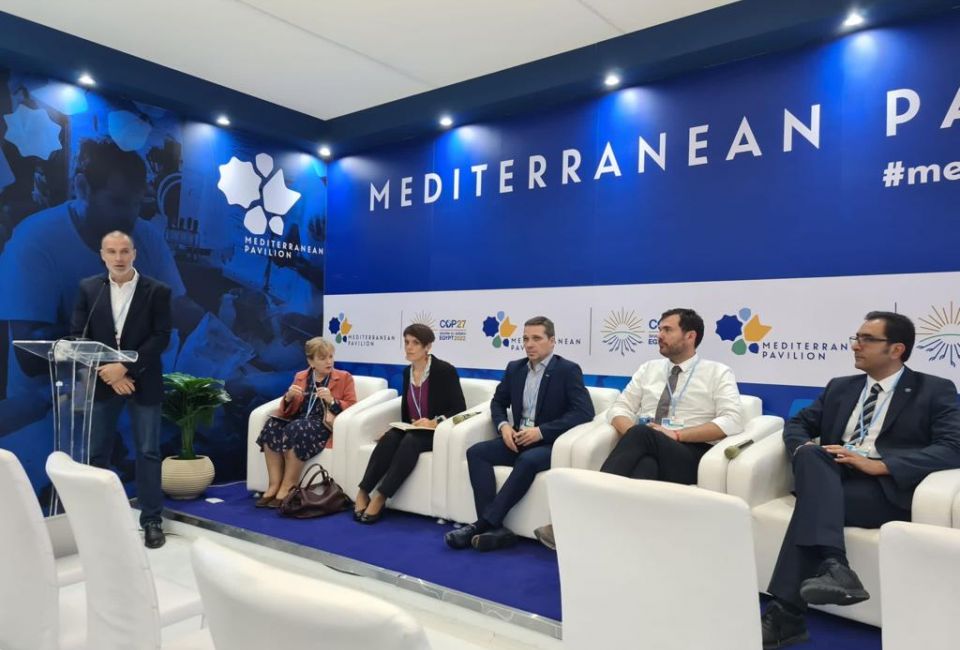
Sergio Ponsá, the director of the CT BETA, defends research and innovation to address the challenges facing the Mediterranean region at COP27
The BETA Technology Center of the University of Vic Central University of Catalonia played a major role at the 27th United Nations Climate Change Conference (COP27), which took place in Sharm El-Sheikh (Egypt) from 6 to 18 November. The director of the CT BETA, Sergio Ponsá, represented the centre in three sessions in which he participated as a speaker, as part of the programme of activities that took place in the Mediterranean Pavilion. In his speech, Ponsá defended the need to promote research and innovation in order to be able to address the challenges of the Mediterranean region.
The director of CT BETA also referred to the need to implement actions on the ground, as well as to improving the dissemination of research results so that they can have a greater real impact. Faced with some more pessimistic attitudes to climate change, Ponsá tried to convey positive messages about how to address some specific challenges, such as the sustainability of agri-food systems based on the experiences of projects by the BETA Technological Center which have tested new valorisation strategies, including Fertimanure and AccelWater.
The first session in which Ponsá participated, which was organised by the PRIMA Foundation, placed agri-food systems at the centre of the debate on sustainable development, due to their impact on climate change, CO2 emissions and the need to improve food security on a global scale. Part of his speech was devoted to explaining the contribution made by the TRANSITION project, within which work is being done to identify real practices that help incorporate new agricultural and forestry practices into the Mediterranean context.
Ponsá's second speech took place in a session organised by MedWaves, in which he reflected on the links between the circular economy and reductions in greenhouse emissions, and explored the potential of key value chains and the multiple opportunities for social and economic development that a more circular economy model can provide. Ponsá presented some strategies to improve circularity based on the new alternatives in traditional agri-food value chains offered by the bioeconomy.
Finally, in one of the sessions organised by the Interreg MED programme, he set out why green and blue innovation should move forward together, and he discussed the role of public authorities in the adoption of circular economy strategies in these areas. This session featured a strong presence of the Med Green Growth Community, which has been led by CT BETA since 2016, and is supported by the Union for the Mediterranean.
Involvement in Euro-Mediterranean programmes
The involvement of the CT BETA in the Mediterranean Pavilion at COP27 is no coincidence, as the technological centre has participated in many Euro-Mediterranean programmes. Indeed, the Union for the Mediterranean has ended up explicitly supporting projects such as the one by the MED Green Growth community. A significant number of Catalan institutions work based on a Mediterranean perspective (MedCities, EMEA, MedWaves, etc.). This situation creates many opportunities for working together, as was apparent in the Mediterranean Pavilion. "Many challenges are shared by the north and south of the Mediterranean, and that is why it is necessary to work with a global perspective, a perspective that the EU did not have until a few years ago, but which is now becoming a clear commitment," explains Ponsá.
Many of CT BETA's Mediterranean projects are the result of Governance for Sustainability Area, which was created as a major commitment that the centre made at the time. This area works to enhance the impact of the results of research and innovation projects, particularly in the definition of new regulations or political strategies. On this subject, Ponsá said: "We are trying to make the initiatives that come from Brussels better suited to the situation in the Mediterranean."
For the first time, this climate change conference included the Mediterranean Pavilion, an initiative organised by the Union for the Mediterranean, the PRIMA (Partnership for Research and Innovation in the Mediterranean Area) Foundation and UNEP-MAP, with a number of important organisations and a scientific committee led by Mediterranean experts on climate and environmental change (MedECC), which includes 600 scientists.